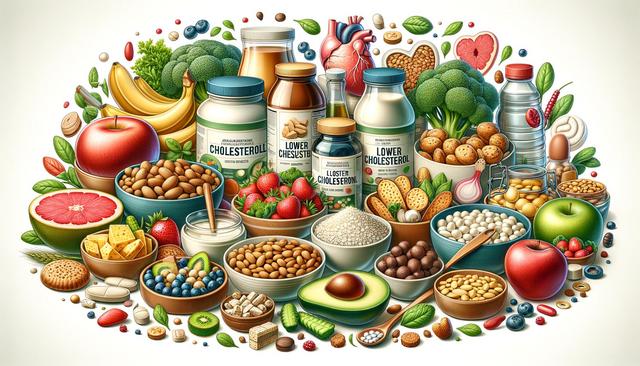The Role of Diet in Cholesterol Management
Cholesterol levels are significantly influenced by dietary habits, making food choices a primary focus in managing heart health. While genetics and lifestyle factors like exercise and smoking also play roles, what you eat can either elevate or help reduce your cholesterol. The key is to incorporate foods known for their cholesterol-lowering properties and reduce intake of those that contribute to higher levels of LDL (low-density lipoprotein), often referred to as ‘bad’ cholesterol.
Whole foods rich in soluble fiber are particularly effective. Soluble fiber binds to cholesterol in the digestive system and helps remove it from the body before it enters circulation. This is why oats are frequently recommended—just one serving can make a notable difference when consumed regularly. Similarly, legumes like lentils and chickpeas are excellent sources of both protein and fiber, making them a smart dietary staple.
In contrast, saturated and trans fats found in processed snacks, fried foods, and fatty cuts of meat can increase LDL levels. Replacing these with healthier fats from plants and fish can shift the balance toward HDL (high-density lipoprotein), which helps transport excess cholesterol away from arteries. The goal is a balanced diet that supports long-term cardiovascular health.
Top Cholesterol-Lowering Foods
Some foods stand out for their potential to help reduce cholesterol naturally. These items not only support heart health but also offer additional nutritional benefits like antioxidants and healthy fats. Including these in your meals can make a meaningful difference over time.
Here are some foods known to support lower cholesterol levels:
- Oats and barley: Contain beta-glucan, a type of soluble fiber shown to reduce LDL cholesterol.
- Nuts: Almonds, walnuts, and other varieties are rich in unsaturated fats and plant-based proteins.
- Fruits like apples and berries: High in pectin and antioxidants, which support heart health.
- Leafy greens: Vegetables like spinach and kale contain fiber and compounds that block cholesterol absorption.
- Fatty fish: Salmon, mackerel, and sardines are high in omega-3 fatty acids, which support lipid balance.
Adding a combination of these foods into your daily meals provides a well-rounded approach to cholesterol management. Making consistent dietary changes yields better results than temporary or restrictive eating plans.
Supplements That May Support Cholesterol Reduction
In addition to dietary adjustments, certain supplements may help lower cholesterol, especially when paired with a nutritious eating plan. While supplements should not replace whole foods, they can provide targeted benefits for those needing additional support. It’s always advisable to consult a healthcare provider before beginning any supplement regimen.
Popular supplements with evidence supporting their role in cholesterol management include:
- Plant sterols and stanols: Naturally occurring substances that block the absorption of cholesterol in the intestine.
- Omega-3 fatty acids: Found in fish oil or algae-based supplements, they help reduce triglycerides and support overall heart health.
- Psyllium husk: A soluble fiber supplement that aids in reducing LDL cholesterol when taken regularly.
- Niacin (vitamin B3): Known to raise HDL cholesterol, though it should be taken under medical supervision due to potential side effects.
- Red yeast rice: Contains compounds similar to statins, but quality and safety can vary widely between products.
When used responsibly, supplements can enhance the effects of a heart-healthy lifestyle, but they are most effective when combined with diet and exercise.
Lifestyle Changes to Enhance Dietary Efforts
While foods and supplements play critical roles, lifestyle choices can amplify their benefits or, conversely, reduce their effectiveness. For example, physical activity boosts HDL cholesterol and can help maintain a healthy weight, which is important for managing LDL levels. Similarly, quitting smoking and limiting alcohol intake can improve overall cardiovascular outcomes.
Here are practical lifestyle habits that support cholesterol reduction:
- Regular exercise: Aim for at least 150 minutes of moderate aerobic activity per week, such as brisk walking or cycling.
- Weight management: Reducing excess weight can lead to significant drops in LDL and triglyceride levels.
- Smoking cessation: Improves HDL cholesterol and reduces risk of heart disease.
- Stress management: Chronic stress may influence cholesterol levels indirectly through hormonal pathways and poor lifestyle choices.
Incorporating these changes helps create a comprehensive approach that supports not only cholesterol management but also broader health benefits, including reduced risk of diabetes and hypertension.
Creating a Sustainable Cholesterol-Lowering Plan
Long-term success in lowering cholesterol often depends on creating a plan that is sustainable and adaptable to individual preferences and needs. Rather than focusing on short-term diets, adopting a way of eating and living that fits into your lifestyle increases the likelihood of lasting improvements.
Here are some tips for developing a cholesterol-friendly routine:
- Meal planning: Prepare meals in advance to avoid impulsive, less healthy food choices.
- Read food labels: Look for fiber content and avoid products high in saturated and trans fats.
- Stay consistent: Even small changes, when maintained over time, can lead to meaningful health improvements.
- Monitor progress: Regular check-ups with your healthcare provider can help track cholesterol levels and make adjustments as needed.
By integrating dietary changes, supplements, and healthy habits into your daily life, you can take meaningful steps to lower cholesterol and support your heart health. Patience and consistency are key—cholesterol management is a marathon, not a sprint.
Conclusion: Prioritizing Heart Health Naturally
Lowering cholesterol through diet and supplements is a proactive and effective way to support cardiovascular health. By embracing foods rich in soluble fiber, healthy fats, and plant compounds, and using supplements where appropriate, individuals can make tangible improvements to their lipid profiles. Coupled with exercise, weight management, and other healthy habits, this holistic approach empowers you to take control of your heart health for the long term. Always work with a healthcare provider to tailor a plan that suits your unique needs and goals.


